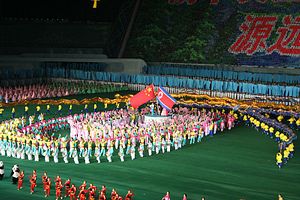The China-North Korea relationship has always been somewhat hazy, a difficult thing for many people to describe. Particularly after the emergence of the North Korea nuclear issue, as the situation on the Korean Peninsula turns more intense, China seems to intentionally avoid provoking North Korea (although sometimes both diplomatic and economic measures are applied by Beijing). But when tension on the peninsula subsides for a while, these two countries hardly share a true intimacy like the close ties between allies. This poses a question: how close are China and North Korea? Or, to be more pointed, does China need to abandon North Korea?
Domestic opinion in China has been clear, although sometimes antithetical. Some scholars believe that China needs to free itself from the old Cold War regional framework, especially given that North Korea’s importance as a “buffer zone” is actually decreasing as the means of modern warfare and form of competition among countries change. These scholars argue that China thus needs to give up North Korea based on a series of serious considerations, such as North Korea’s persistence in its nuclear program despite China’s deep concerns. Although these scholars do not necessarily speak for the Chinese government, their arguments to some extent reveal certain attitude changes among the Chinese public and even some government officials. Meanwhile, other scholars claim that geopolitical factors continue to prevail especially in Northeast Asia, which can be seen by the consistent or even intensified U.S. military presence. Hence China “abandoning” North Korea might cause a chain reaction in the region, and in a worst-case scenario would force China into a passive role.
In fact, China’s attitude toward North Korea has been through an uneasy but uncompromising change. We can see this in China’s official statements after North Korea’s several nuclear tests: by calling Pyongyang’s first nuclear test “flagrant,” the message to North Korea and the international community was very clear. China will never compromise its national interests because of North Korea’s obstinacy. From a “friendship sealed in blood” to the claim of “normal state-to-state relations,” bilateral relations between China and North Korea have been through a lot of stages. This relationship can hardly be regarded as a genuine, stable alliance, at least not in the same vein as the U.S.-South Korea alliance.
Therefore, China may not need to “abandon” North Korea, just as China never truly “had” North Korea. Currently, there are several trends at work: China’s non-alignment diplomatic principle, China’s opening-up and merging into the international community, the normalization of China’s diplomatic relationship with South Korea, and China’s increasing attention to its international image when dealing with regional issues. All of these factors prove that emphasizing “normal state-to-state relations” with North Korea does not necessarily mean China is making a calculated ploy to evade its responsibilities to employ more decisive and effective measures (which to some degree China has not done). China’s intended message could be that “normal state-to-state relations” is not a future goal, but a plain description of the status quo between China and North Korea.
Based on this theory, China and North Korea are absolutely two independent sovereign states. By extension, when it comes to North Korea issues, China is not concealing a golden bullet. As to how to deal with North Korea, China’s has to consider three factors: its own national interests (including security concerns, which might include viewing certain North Korean behaviors as provocations), regional integrated peace and stability, and concerns from the international community including China’s international image. Hence, the question of whether or not China should abandon North Korea may not come down to a simple yes or no.
































